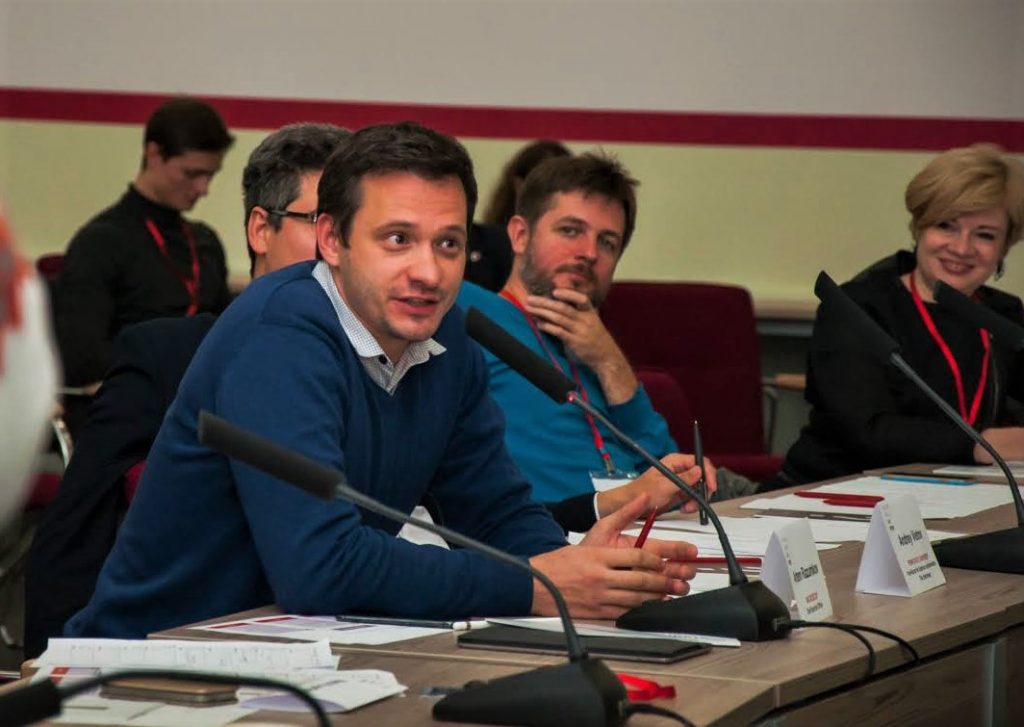Interested in IT? Looking for ideas in business? Got to offer something yourself?
“Success is where your heart leads you to, avoiding popular trends. The IT rush will not last forever…Unless you fully embrace your path, I would not recommend treading this way, just following fashion,” our speaker confides.
Read an inspiring interview with Artem Razumkov, graduate of the Faculty of Physics, PSU. Artem is known as a co-founder of the Macroscop company, which software operates in more than 500,000 surveillance cameras, around the world, today.
Hello, Artem! Will you recall the first time you ‘visioned’ your own IT company… Did it happen while studying at the University?
Well, I had different visions those days. In fact, I started my company only a few years after the graduation. I first worked in a fairly large local company installing video surveillance systems. One day, I came up with an idea to create a product aiming to meet the requests of multiple people. Something like the global search engines of Google or Yandex, but directly for the video content. Unfortunately, the company’s management showed no interest in my idea, so I had no choice but rather act on my own.
Today, our company operates in dozens countries’ markets. We develop software for video surveillance systems. The program allows to analyze a video stream and recognize its objects. For instance, it might help the university to analyze which students attend classes by recognizing their faces. The students, in turn, may spot the university cafeteria with a smallest queue, at the moment. These cases are abundant: smart video surveillance systems can solve problems at colleges, banks, large shopping centers and industrial enterprises.

Are IT specialists still in demand in the modern labor market?
Sure! Due to the fact, that many processes can be improved through automation, the demand for such specialists is great today. This is true even for conservative industries previously never related to IT. Let’s take the Yandex.Taxi as an example. It’s service has radically changed the passenger transportation market of light vehicles use. Although there are plenty of examples, The IT rush will not last forever, in my opinion. Unless you fully embrace your path, I would not recommend treading this way, just following fashion. I’d say, do what you really care about.
How would you assess the quality of training IT specialists at PSU?
As far as I am concerned, Perm State University closely follows trends in the information technology market and tightly cooperates with leading companies in the industry. As a consequence, new educational areas and specialties appear at the Faculty of Physics and the Faculty of Mechanics and Mathematics, PSU, aiming at the modern IT market.
Equally important is the fact that the University offers fundamental higher education, in the first place. In particular, that means that the educational services by the University allow to form the so-called fundamental knowledge, rather than prepare narrow-focused specialists with a limitation of applied competencies, required by a stand-alone enterprise.
This means that PSU graduates possess certain basic knowledge allowing them to independently master new competencies necessary to solve newly emerging problems, in the future. As you can imagine, this is a more flexible approach, and it is more preferable for the rapidly changing IT market.
Still, what interesting trends in the IT market would you highlight, despite the fact it is so volatile?
I am always on my toes monitoring the directions in which some areas of the IT market grow. Still, it is not certain whether they will manifest themselves in the future. Particularly, I am attracted by technologies that allow a person to enter information into a computer with no muscle effort. Yes, I am talking precisely of the actions performed by the power of thought, such as typing text on a computer or driving a self-propelled wheelchair.
Today, the data transfer rate in such systems is still quite slow and reaches only a few bytes per second. Still, I am sure it will increase, over time. Not only will this technology help people with disabilities, but will also introduce dramatic changes in various industries.
In addition, I follow the progress of augmented reality (AR) technologies today. Over the past five years, no tangible breakthroughs have been made in this area, yet, in my opinion, they may occur in the feasible future.
News Source: Permsky Universitet Newspaper: http://www.psu.ru/files/docs/ob-universitete/smi/gazeta-permskij-universitet/2020/PU_1914.pdf
Find more info and opportunities at PSU international web site.
See PSU Facebook for more news.
